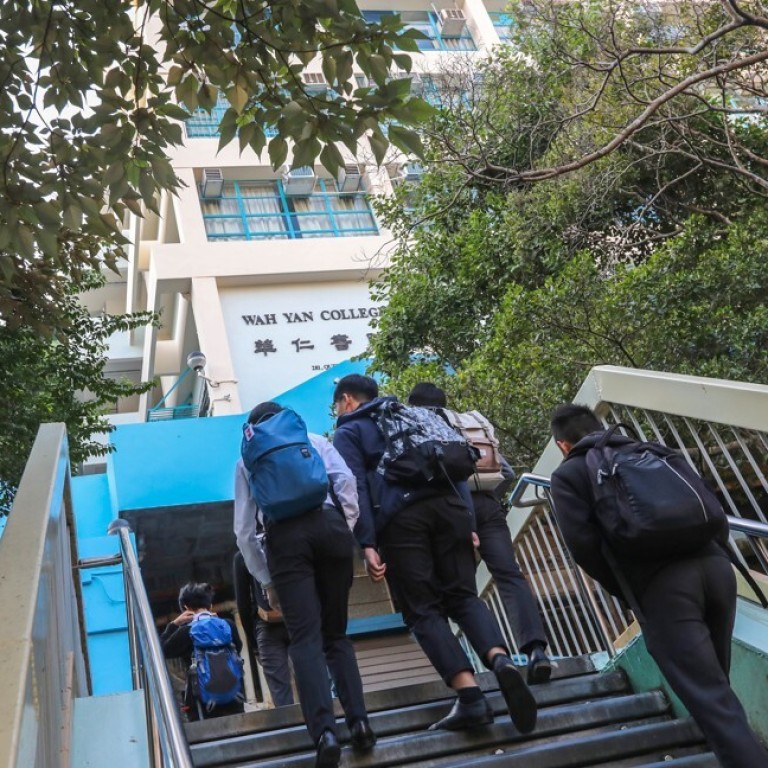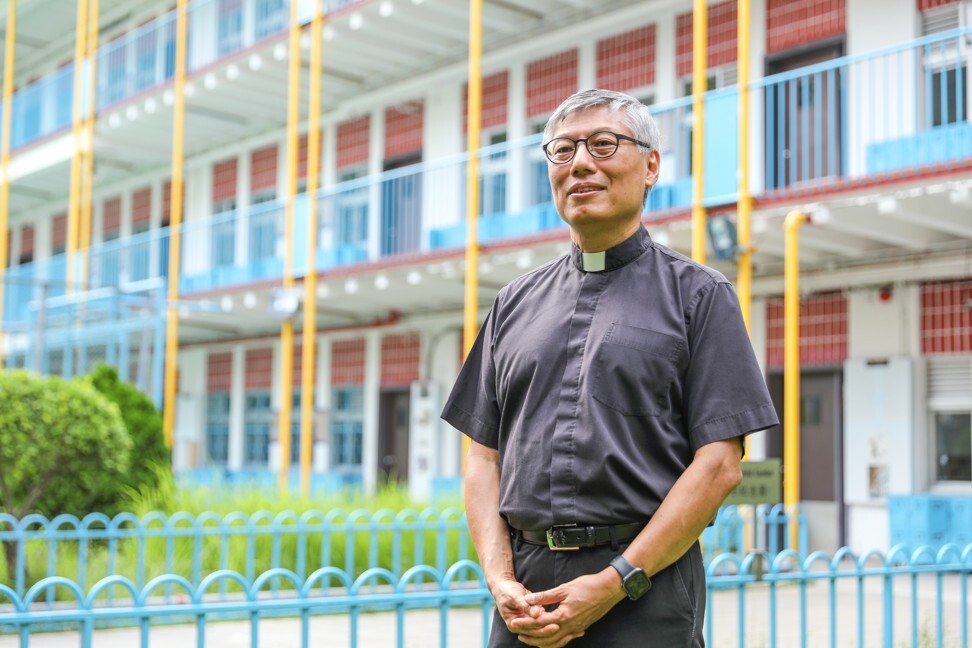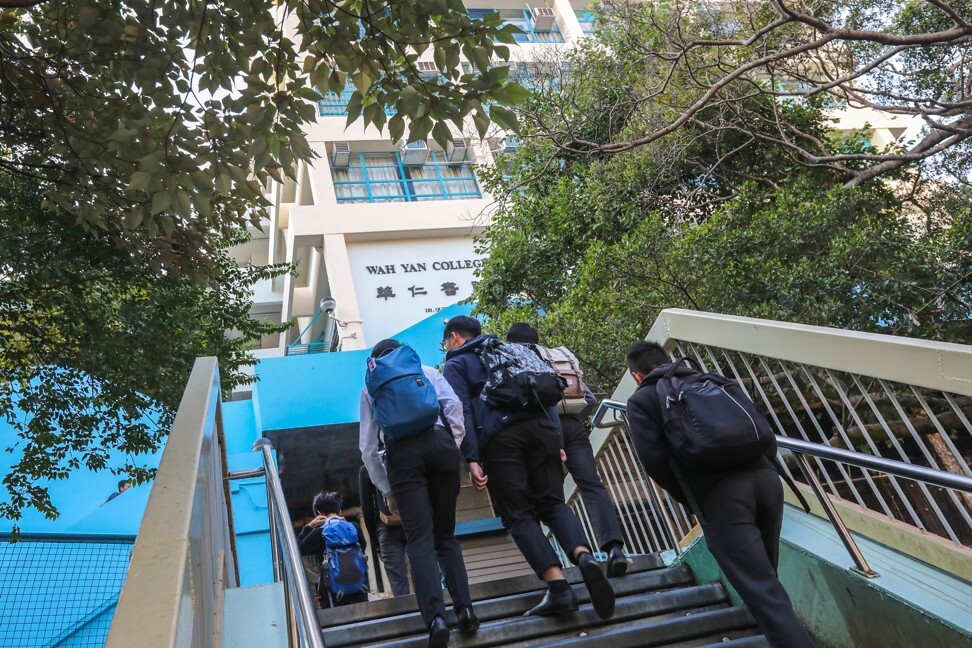
National security law: Hong Kong independence ‘not off-limits’ in classroom discussions, head of two elite schools says
- While not taboo on campus, the topic must only be discussed in academic way that does not promote the idea, Stephen Chow says
- Head of the Wah Yan colleges is among those preparing for pupils’ return to school under the national security legislation
The head of two elite schools has said Hong Kong independence and other sensitive topics are not taboo on campus under the national security law, as long as discussions refer to different perspectives and do not advocate concepts such as separatism.
Wah Yan Hong Kong and Wah Yan Kowloon colleges also said they would incorporate national security education into their curriculum in adherence to guidelines the Education Bureau was expected to issue, while neutrality would be preserved in their teaching.
The legislation which Beijing imposed on the city on June 30 targets acts of secession, subversion, terrorism and collusion with foreign forces to endanger national security. It also requires the promotion of national security education at schools.
Father Stephen Chow Sau-yan, supervisor of both colleges, which are run by the Chinese Province of the Society of Jesus, said that schools had a responsibility to teach students about the legislation.
Hong Kong schools to get new teaching guidelines on security law
“It should be [presented] as an objective fact, no matter whether one agrees with the law or not. That does not mean that we are taking sides,” he said in an interview last week.
Both Wah Yan colleges have been known for having politically active students. In 2016, the student concern group at Wah Yan Kowloon openly said that Hong Kong independence was “one of the ways out”.
To discuss the topic does not mean we support the notion of Hong Kong independence.
In the same year, Wah Yan Hong Kong’s annual teacher-student Chinese debate on the topic of whether the schools “should not allow the spreading of the idea of Hong Kong independence on campus” attracted criticism from pro-establishment figures.
Asked if there was still scope for discussing the issue following the enactment of the national security law, Chow said the answer was not an “absolute no”, and that students should still be allowed to engage in dialogue on campus to further understand what the concept entailed.
“To discuss the topic does not mean we support the notion of Hong Kong independence. But students can understand what the idea is, what the pros and cons are, and discussions can happen only after they have an understanding,” said Chow.
Catholic schools in Hong Kong told to keep ‘one-sided politics’ out of classroom
“And when they have more understanding, they would probably know that under the broader reality, there is no way that the notion of [Hong Kong independence] can move forward. And we shall stop there … [It is important] we are not promoting the idea.”
He added: “I used to teach ethics classes myself, where some topics can be sensitive, such as euthanasia, which has remained controversial even until now. I would present the various perspectives, including the church’s views, and then we can have a discussion.”

Alumni from both schools include education minister Kevin Yeung Yun-hung, security chief John Lee Ka-chiu who also sits on the newly set-up Committee for Safeguarding National Security, and former city leader Donald Tsang Yam-kuen.
Last month, the city’s Catholic diocese issued a letter to nearly 200 denominational schools, including both Wah Yan colleges, urging them to promote a “correct understanding” of the legislation and enhance pupils’ sense of national identity.

05:50
What you should know about China's new national security law for Hong Kong
In a letter to parents at both colleges before the school year began in September, Chow also told students that political activities such as “class boycotts and propaganda of all sorts” were inappropriate on campus, while reminding them to be “extremely careful about legal and other serious consequences of their actions for themselves as well as others”.
Warren Chung Wai-leung, principal of Wah Yan Kowloon, agreed the national security legislation should be taught in a neutral manner to students. “Only by understanding the law would students know what rights they have, as well as what responsibilities that they will have to bear.”
Chung added: “But we will be extremely careful and will not express our own views to influence a student’s opinion.”

Principal of Wah Yan Hong Kong, Davis Chan Wai-lun, meanwhile, said the school‘s civic education committee – which includes staff teaching liberal studies, Chinese language and the country’s history – had been reviewing how elements related to national security education could be incorporated into the syllabus.
Classes at Hong Kong schools have been conducted online because of the Covid-19 pandemic, but face-to-face learning is to return in phases from September 23 following a drop of city infections.
Keep views on Hong Kong politics private, international school group warns teachers
Chow said although he hoped not to see radical protests by students on campus after on-site classes resumed, he stressed that it was important to listen, teach and guide students even if they were to happen.
“What we are promoting here is a liberal education. In other words, pupils have to learn about the different perspectives of various matters,” he said.
“The future of Hong Kong lies in the hands of our next generation. To be able to nurture students to become an in-depth person with analytical skills, it is important to lay down a moral foundation for them.”

